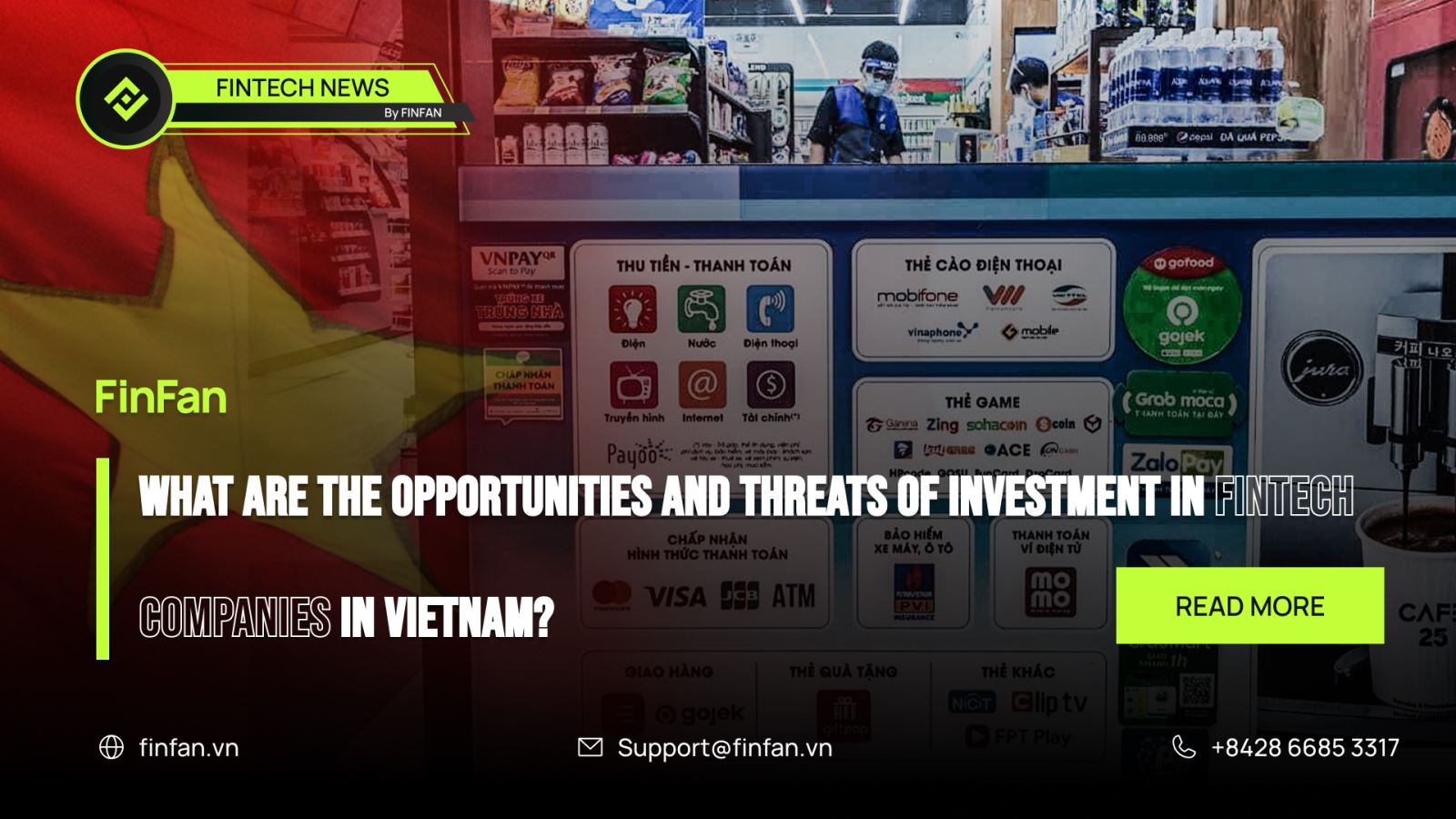What are the opportunities and threats of investment in fintech companies in Vietnam?

Fintech in Vietnam is grown so fast in recent years. That’s why this field is always an excellent target for investors to enter and compete for this potential market share.
This piece of cake nevertheless comes with many hazards, which investors should be aware of to determine for themselves the best investment plan and the best firm for their particular budget.
In this article, let’s find out with FinFan what the opportunities and threats of investment in fintech companies in Vietnam are.
The first is the potential for investing in fintech firms.
Here are three benefits that come with investing in fintech.
- Digitalization trend of Vietnamese banks
Since Timo's digital bank appeared on the Vietnamese market, a series of events have caused traditional banks to change their minds and start a digital transformation revolution of the entire banking industry.
This revolution has improved customer experiences and made it easier for clients to resolve banking-related issues without having to visit a branch and go through the tiresome process.
Additionally, this digital transformation aids the bank in reducing some expenditures related to infrastructure and people.
This is also a good reason for investors to invest in the NEOBank and digital banking industries. Due to Gen Z and later Gen Alpha’s love of such technological experiences and their potential to become loyal customers in the near future.
- Cashless movement is increasingly popular in the Vietnam market
As stated in the article Why are companies in the ewallet and digital bank fields always leading? MoMo's electronic wallet is now so practical that regular individuals, store owners, and operators of street carts may all use it.
This approach is unique in that it may be used in any client segment, for example, ewallets are frequently used by people with more conditions to pay for expenses like tuition, insurance, and even receiving remittances from abroad.
With the aforementioned indications, it is also important to pay attention to the e-wallet market because of the chances for profitable and quick development as well as the potential for significant creeping into people's lives in the most efficient manner, Vietnam.
- The Vietnamese people's need to trade with foreign countries as well as receive money from abroad is increasing
Vietnamese businesspeople (especially those who frequently purchase goods from China or some other advanced countries to trade) are accustomed to sending and receiving money internationally as well as the growth of e-commerce and cross-border trade.
Because of that understanding, a number of NEOBanks services were born and helped merchants to trade internationally more easily through some ecommerce paymet processing.
It presents a chance for investors to fund NEOBanks businesses that have the potential to replicate this model in the ensuing years.
Next are the challenges of investing in a fintech startup
On the other hand, when investors choose to invest in fintech businesses, they can cause a lot of difficulties.
- Legally entangled
The state bank, which is in charge of most transactions from Vietnam to other nations, is required to be involved in these transactions.
To be able to carry out any cross-border activities, a fintech company (especially one involved in overseas transactions) must hold a license from them.
In addition, the state bank has the right to visit fintech businesses at any time if there are indications of transactional irregularities or funds that are not consistent with financial statements (these are typically covered by banking legislation).
Investors should carefully analyze the legal ramifications before beginning to participate in the fintech industry and make sure that the fintech company complies with the terms of its license and its yearly financial statements.
- Can burn money for a long time in revolving capital and finding new customers
The fact that fintech companies burn money to be able to implement their plans to attract users forces them to spend a long time burning money (similar to ecommerce segment).
Some companies have escaped this difficult early stage with their very creative marketing methods, such as MoMo or Viettel Pay.
After that, though, they must continue to compete in the race to burn money in many different ways (for instance, MoMo is an investment in a TV game show or other media channel).
Therefore, while choosing to invest in a fintech company, investors should take their investment budget into account in order to be able to stick with these businesses for a long time and burn through a lot of money; otherwise, they risk being disappointed when their investments do not provide immediate returns.
- Embrace the blockchain trend but still have to watch out for the risks that come from it
Blockchain is a brand-new, extensively developed technology that benefits businesses worldwide and not just in the finance industry.
However, blockchain is most frequently used in conjunction with fintech in Vietnam, where people are more familiar with cryptocurrencies than anything else.
In Vietnam, cryptocurrencies have not been widely applied to business projects and are usually only known through trading activities on exchanges such as Binance, Huobi, etc.
Due to some legal risks, companies that conduct cryptocurrencies have to suspend their projects because, as stated, all their actions are strictly regulated by the State Bank.
Therefore, when investors want to invest in this field in Vietnam, now is not the time to do so.
However, there are still good signs when a Vietnamese e-commerce platform has been trying to create its own crypto currency, Tiki, and gradually apply it in practice.